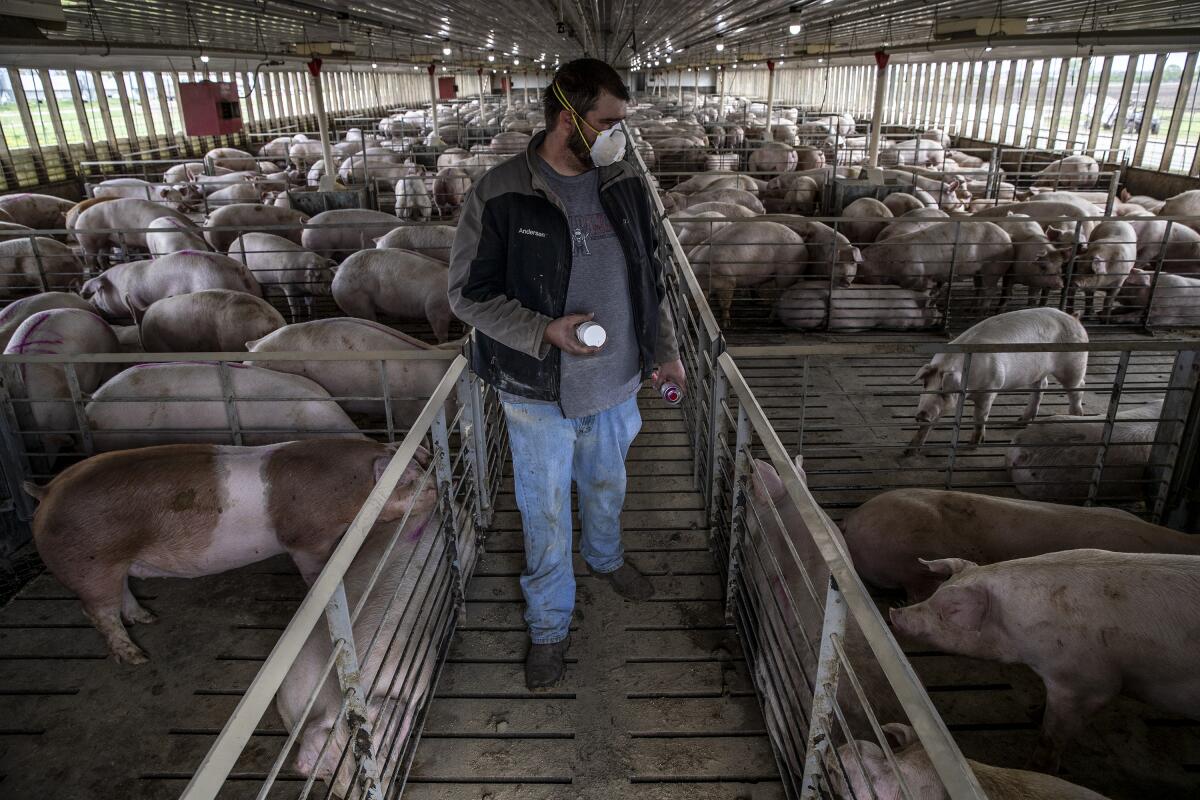If bacon costs more next year, blame the pork producers, not the law treating pigs better

- Share via
Before you worry about bacon and how much it may cost when new animal welfare laws go into effect next year, let’s talk about the pigs that gave their lives for it.
California has been on the forefront of protecting animals who live short, dismal lives on factory farms either to produce food for us (egg-laying hens) or to be slaughtered and sold as food — such as the ducks and geese whose livers are turned into foie gras, the calves that will be served as veal or the pigs that continuously produce piglets before being carved up into pork. Even animals that end up as food deserve to be treated without cruelty before they are killed.
The latest advance came in November 2018, when 62.7% of the state’s voters supported Proposition 12, the Prevention of Cruelty to Farm Animals Act. The law began going into effect last year, requiring hens and veal calves to be given more space to live in. Starting Jan. 1, the law will require that all eggs sold in California come from cage-free hens and that pork sold in the state come from breeding pigs that are not held in cramped cages. These are humane steps designed to lift these animals out of structures that barely allow them to move.
Pork producers have had the longest time to comply. Some big companies like Hormel Foods have pledged to do so fully, but others have spent the last few years fighting the law rather than figuring out how to implement it. They say that the law will significantly raise the price of pork and that it violates the Commerce Clause of the Constitution, which gives Congress sole power over interstate business activity. So far, that fight has been a waste of time that pork producers could have better spent figuring out how to reconfigure their farms.
They also complain that the regulations on the law are not set. But the California Department of Food and Agriculture, which has yet to finalize the regulations, says that the delay should not have stalled producers from retrofitting their housing for breeding pigs. The agency has publicly posted draft regulations, which mostly concern record-keeping, certification and definitions of terms. As the agency said in a statement to the Associated Press, the rules about space were set out in the 2018 ballot measure, and no regulations can change them.
There are pig farms here in the state, but most of the pork eaten in California is brought in from elsewhere. (Iowa is the country’s largest producer of pork.) Under the new law, all California producers as well as out-of-state producers who sell pork to California can no longer keep sows in cramped gestation crates that literally don’t allow them to stand up and turn around. Instead, pork must come from breeding pigs allowed enough room — 24 square feet of space — to stand up, turn around and spread their limbs without touching the sides of an enclosure or another animal.
Trade associations representing pork producers have sued the state, but so far they have been rebuffed by the federal courts. The 9th Circuit recently rejected an appeal from the National Pork Producers Council and the American Farm Bureau Federation, which argued the California law would force out-of-state suppliers to make substantial changes to their operations and raise production costs by 9%, which would then raise the sale price of pork.
The appeals court noted that state laws run into trouble with the Commerce Clause only if they treat in-state producers differently from out-of-state producers and if they interfere with interstate commerce nationally — neither of which is the case here, regardless of the costs imposed on pork producers. As Judge Sandra S. Ikuta wrote for the three-judge panel, “[S]tate laws that regulate only conduct in the state, including the sale of products in the state, do not have impermissible extraterritorial effects.” Nevertheless, farmers in Iowa have filed separately for an injunction against the law, and a hearing is scheduled for this month.
For fans of bacon and other pork, any rise in cost is the price of not having a pig suffer before it’s killed for food. It’s a price the animals shouldn’t have to pay.
More to Read
A cure for the common opinion
Get thought-provoking perspectives with our weekly newsletter.
You may occasionally receive promotional content from the Los Angeles Times.









